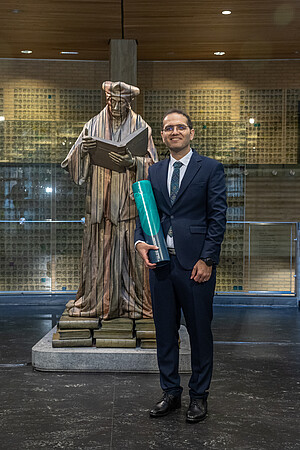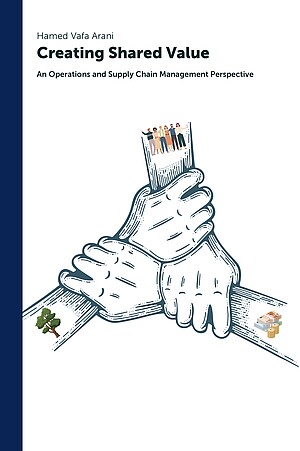PhD Defence Hamed Vafa Arani

In his dissertation, Creating Shared Value: An Operations and Supply Chain Management Perspective, ERIM’s Hamed Vafa Arani explored the concept of creating shared value to identify holistic strategies that offer a comprehensive grasp of profit, people, and planet objectives. Specifically, the dissertation explores two areas where this integration is crucial: servicising business models and drug shortages. The first topic focusing on pricing policies reveals that the sweet spot between environmental benefits and firm profitability can be achieved with a pay-per-use policy offered to high usage-valuation consumers, while a win-win-win strategy is unattainable. The second topic on the impact of tendering on drug shortages unveils how a less concentrated market can relieve the impact's severity, thus suggesting a drug shortage mitigation strategy to policymakers. Through the lens of operations and supply chain management, Hamed's work is an asset for the transition to a more circular economy.
Hamed defended his dissertation in the Senate Hall at Erasmus University Rotterdam (EUR) on Thursday, 5 October 2023. His supervisors were Prof. dr. ir. René de Koster (RSM) and Dr. ir. Harwin de Vries (RSM). Other members of the Doctoral Committee were Prof. dr. ir. Luk van Wassenhove (INSEAD), Prof. dr. ir. Rob Zuidwijk (RSM), Dr. ir. Zümbül Atan (Eindhoven University of Technology), Prof. dr. ir. Rommert Dekker (ESE), Prof. dr. ir. Sander de Leeuw (Wageningen University & Research), Dr. Cynthia Qingxia Kong (RSM) and Dr. Renzo Akkerman (Wageningen University & Research).
About Hamed Vafa Arani

Hamed Vafa Arani was born on June 11th, 1991 in Aran-o-Bidgol, Iran. He pursued his studies in Industrial Engineering at the University of Tehran, Iran. In August 2015, he earned his M.Sc. degree, after which he worked as a Business Process Analyst for two years. In 2017, Hamed joined the Department of Technology and Operations Management at Rotterdam School of Management, Erasmus University, under the supervision of Professor René De Koster and Dr. Harwin de Vries, to pursue his Ph.D. Dr. Erwin van der Laan also supervised his research during his doctoral studies.
Hamed's research interests revolve around incentive design and evaluation for all business stakeholders to foster socially responsible supply chains by optimizing business model elements, designing experiments, and performing statistical analysis. His research work is primarily focused on two areas: designing product-service systems and addressing drug shortages. His work has been published in the European Journal of Operational Research and has also been presented at various international conferences. His research builds on organizational and sociological theories and seeks to expand our understanding of implementing the United Nations’ Sustainable Development Goals in emerging economies. In addition, he is developing matched-samples meta-analysis as a new way of conducting cross-country comparative studies.
Thesis Abstract

Focusing solely on short-term profits has caused social, environmental, and economic problems. Creating shared value integrates profitability with social and environmental objectives, offering a holistic solution. This dissertation examines two areas where this integration is crucial. The first topic explores servicizing business models for a transition to a more circular economy, emphasizing environmental benefits and firm profitability. Initially, we focus on pricing policies, comparing pricing schemes across consumer segments to identify win-win-win strategies that meet all people, planet, and profit objectives. Our research reveals that pay-per-use schemes outperform pay-per-period schemes for cost-inefficient or small-scale providers. A win-win (profit and planet) strategy can be achieved by offering a pay-per-use policy to high usage-valuation consumers, but a win-win-win strategy is unattainable. We then investigate consumer choices in servicizing models by conducting a conjoint experiment on payment scheme, price, minimum contract duration, and entry label attributes. The payment scheme emerges as the most influential attribute, with purchasing and pay-per-use schemes being popular options. The second topic focuses on drug shortages. Specifically, we examine the impact of tendering on shortages. Our findings demonstrate that tendering reduces prices but increases shortages, particularly at the beginning of contracts. However, shortages are less severe when alternative suppliers are available, and the market is less concentrated. To address this issue, we propose allowing multiple winners, regionalizing tenders, increasing the time between tender and contract initiation, and incorporating a reliability measure as a winning criterion to mitigate shortages.
View photos of Hamed's PhD Defence
Photos: Chris Gorzeman / Capital Images


